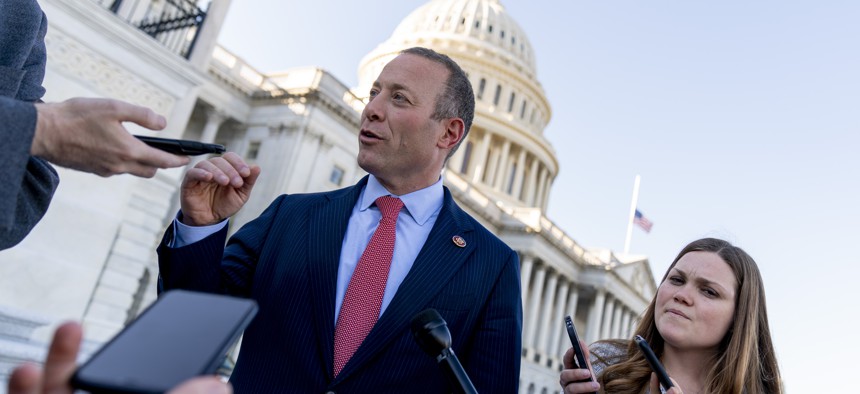Democrats Trying to Nail Down SALT Deduction Cap Repeal Plan

Rep. Josh Gottheimer, D-N.J., speaks to reporters on Oct. 21, 2021. AP Photo/Andrew Harnik
The specifics of lifting the $10,000 limit on the state and local tax deduction were still coming into focus late Tuesday, with a key progressive senator rejecting one leading option.
Congressional Democrats on Tuesday indicated that a roll back—of some sort—with the $10,000 cap on a federal deduction for state and local taxes would make it into the sweeping spending package that they are trying to finalize.
"Reinstating the State and Local Tax (SALT) deduction will be in the final legislative package. Now, we need to get it to the floor for a vote," U.S. Rep. Josh Gottheimer, a New Jersey Democrat, and one of the main proponents of repealing the cap, tweeted on Tuesday.
Later in the day, asked for specifics about what the plan to repeal the cap could look like, Gottheimer declined to provide additional details. "I'm just going to defer to the committee on that, if that's ok," he said. "What I've made pretty clear is that I want SALT back."
One leading proposal drew swift pushback from U.S. Sen. Bernie Sanders, a progressive Independent who caucuses with Democrats.
The cap on the deduction, imposed under the tax law Republicans approved in 2017, is set to expire at the end of 2025.
Proposals that emerged in news reports in recent days called for possibly lifting the cap for two years in 2022 and 2023 and then reimposing it in the following years, possibly through 2026 or 2027.
Then, on Tuesday, Punchbowl News and Bloomberg reported that a five-year suspension, through 2025, was under consideration. The five-year option being discussed would involve reinstating the $10,000 cap from 2026 to 2030, according to the Bloomberg article, which cited comments from a Ways and Means Committee aide.
While lost federal revenues would vary under these different scenarios, each would result in billions in foregone tax collections.
The Committee for a Responsible Federal Budget estimated Tuesday that a five-year repeal would cost roughly $475 billion, with $400 billion of the tax cut going to the top 5% of high-income households.
"That is more than any other part of Build Back Better, including the Child Tax Credit, spending on child care and pre-K, climate-related tax credits, or health care funding," the budget watchdog group said, referring to the name of the domestic spending legislation.
The total cost of the spending package now under consideration is around $1.75 trillion.
Sanders, in a statement, called the five-year repeal plan for the cap "beyond unacceptable," saying that it would result in top earners paying lower taxes after passage of the Democrats' plan than they did after the tax cuts signed into law in 2017.
"Democrats campaigned and won on an agenda that demands that the very wealthy finally pay their fair share, not one that gives them more tax breaks," Sanders added. "I am open to a compromise approach which protects the middle class in high tax states. I will not support more tax breaks for billionaires."
Moving around when the cap is lifted and reinstated has the potential to help make the policy look more favorable when it comes to how it adds to the deficit on the federal government's balance sheet. This would be the case with the five-year repeal option.
"I don’t know exactly how it's going to be resolved," House Majority Leader Steny Hoyer said earlier Tuesday when asked if a version of the cap repeal would be included in the bill. "I think there may well be a provision in there dealing with that and mitigating it to some degree."
Taxpayers can claim the deduction against state and local property taxes, and either income or sales taxes. Prior to the 2017 tax overhaul there was no limit on it.
The tax break predominantly benefits higher earners. But lawmakers from places like New Jersey, New York and California have contended that the $10,000 limit is squeezing middle-income households in their states, which tend to lean Democratic and also have higher taxes compared to other places.
"Oh god, I have earned a Ph.D. in the SALT deduction, because it's been argued from every perspective I can think of," Ways and Means Chairman Richard Neal told reporters Tuesday, responding to questions about the tax break.
But he declined to comment further about whether removing the cap muddles Democrats' messaging that they are trying to craft tax policy that prioritizes middle class and lower-income Americans, after the party claimed during the 2017 tax debate that the GOP forced through legislation delivering big gains to corporations and the wealthy.
Bill Lucia is a senior editor for Route Fifty and is based in Olympia, Washington.
NEXT STORY: Muni Bond Provisions Likely Dead in Democrats' Spending Package






